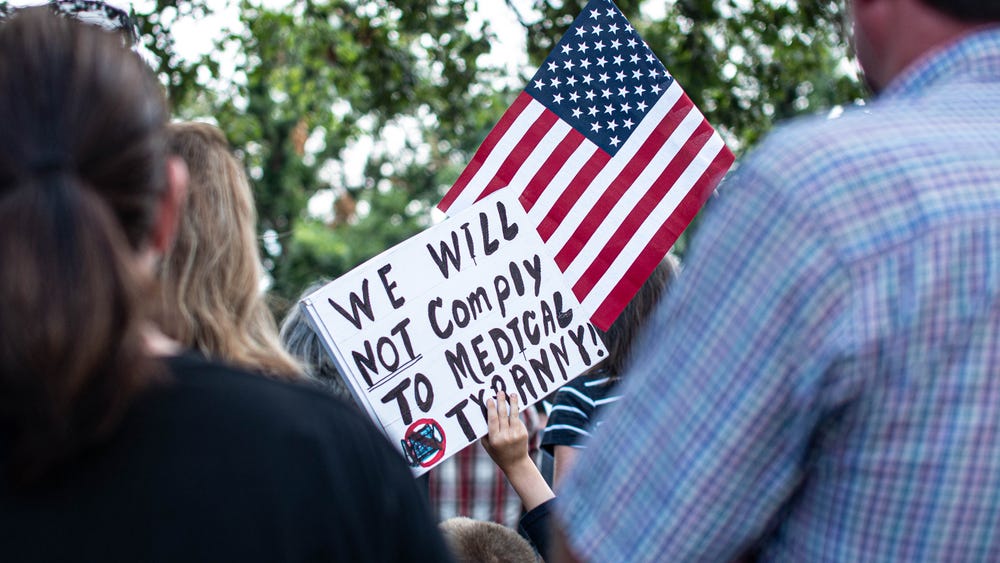E-Pluribus | September 29, 2021
Taking a closer look at redlining, a new Thomas Sowell biography is out, and why President Biden's OSHA vaccine mandate goes too far.
A round up of the latest and best writing and musings on the rise of illiberalism in the public discourse:
John McWhorter: What’s Missing From the Conversation About Systemic Racism
In his column at the New York Times, John McWhorter takes a nuanced look at some of the evidence that is presented in debates over systemic racism and what it really means versus was it’s purported to mean. McWhorter argues that while the mortgage lending practice of “redlining” clearly impacted a large number of Black Americans, how that practice worked in reality is more complicated than a simple charge of “racism” can explain.
Overall, the Cops and Black People 101 story — that police officers casually mow down Black men while letting white men pass with a summons or a slap on the hand — doesn’t hold up. Many more white men than Black men die at the hands of cops. We just don’t hear that part of the story very much.
So on that gloomy old map you see illustrating articles about housing bias, most people living within the redlined perimeter were likely white, according to the National Bureau of Economic Research study, but we don’t hear that part of the story either.
None of that means that racism hasn’t existed or doesn’t exist. But it also suggests that socioeconomic factors matter as well, and a lot. This is a point made by the historian Touré Reed, who wrote an important book to this effect; his father, the political scientist Adolph Reed Jr., is of similar mind, as is the historian Barbara Fields — all three want us to think more about class than “antiracism.”
In a nutshell, one of my takeaways from redlining and shootings by the police is that alleviating Black poverty makes Black people less susceptible to ills that disproportionately befall those who are poor — ills in which racism surely plays a part, but my interest is in the fact that being poor makes you encounter these things so much more.
Read it all.
Phillip W. Magness: Thomas Sowell: The Anti-Utopian
Economist and philosopher Thomas Sowell has had great influence in conservative and libertarian circles for decades now. Phillip Magness at National Review takes a look at a new biography of Sowell by Jason L. Riley that documents Sowell’s journey out of Marxism to where he is today, and how his move from left to right along with his race have presented unique challenges to both Sowell and his ideological opponents.
In the world of progressive politics, the most visceral displays of rancor and belligerence are often reserved not for the traditional opponents of progressives, who originate outside the political Left, but for apostates from their own ranks. The bitter internecine feuds among socialist intellectuals have long exemplified this pattern, but nowhere is the disdain for political heretics more palpable than in matters of racial and ethnic identity.
The impetus to ostracize a defector from an ideological norm often emerges from the belief that a person’s interests may be ascertained by his or her belonging to a certain group, whose members are assumed to have a uniform set of interests. Karl Marx called this notion “scientific” and purported to identify predictable — even inevitable — social outcomes arising from a perceived struggle between economic classes. When individual political expressions misalign with the predicted interests of a person’s class, the difficulty is resolved not by admitting an error in the underlying theory of class conflict but rather by stripping away the dissenting individual’s agency. The dissenter is presumed to have succumbed to a “false consciousness” or worse — to have become corrupted by the malfeasance of persons acting directly against his or her own interests. Expulsion of the apostate ensues.
Jason L. Riley has given us a fascinating intellectual biography of one such apostate from the ranks of the academic Left, the economist and philosopher Thomas Sowell. In fact, Sowell’s career exemplifies a succession of apostasies from conventional political expectations. A former Marxist whose first significant scholarly paper defended the German philosopher’s prediction of increasing worker misery under capitalist modes of production, he became a convert to University of Chicago price theory under the tutelage of economists George Stigler and Milton Friedman. Born into extreme poverty and never completing his high-school education, Sowell charted an unconventional and self-made course through the highest ranks of academia before settling into a multi-decade career as a theorist and defender of free-market capitalism at Stanford’s Hoover Institution.
Read it all here.
David B. Rivkin Jr. and Robert Alt: Biden’s Lawless Vaccine Mandate
Regardless of the health benefits of COVID-19 vaccinations, David Rivkin Jr. and Robert Alt write at the Wall Street Journal than an OSHA-enforced rule was the wrong way for the Biden administration to go. Rather than go the legislative route, the Biden administration chose a dubious executive/ bureaucratic solution that is not only poorly designed and targeted but raises constitutional questions as well that could very well land the issue in the courts.
Another concern is that the administration’s interpretation of the OSHA statutory language presents a “delegation” problem. If Congress delegates discretion to an agency without a proper limiting principle, it violates the separation of powers. To avoid this constitutional problem, the courts will have to give the statute a more restrictive reading. Coming up with a meaningful judicially enforceable principle would not be easy.
Additional problems arise from the administration’s urgency. In imposing the vaccination requirement immediately, OSHA will bypass the ordinary notice-and-comment rule-making process and issue what’s known as an Emergency Temporary Standard. OSHA has used that legal authority only 10 times in 50 years. Courts have decided challenges to six of those standards, nixing five and upholding only one.
Read the whole thing.
Around Twitter
Bari Weiss covers a broader range of topics with economist Glenn Loury (featured in item #1, September 15th, e Pluribus) on her latest podcast:
Some of the reactions to Matt Lewis’s interview with Glenn Greenwald demonstrate how liberals have tended to distance themselves from Greenwald when they see him as challenging their commitment to their own liberal principles:
Terry McAuliffe, running again for governor of Virginia, made some waves with a comment about who should be telling schools what to teach:
And finally, Johnny Depp recently addressed cancel culture:










